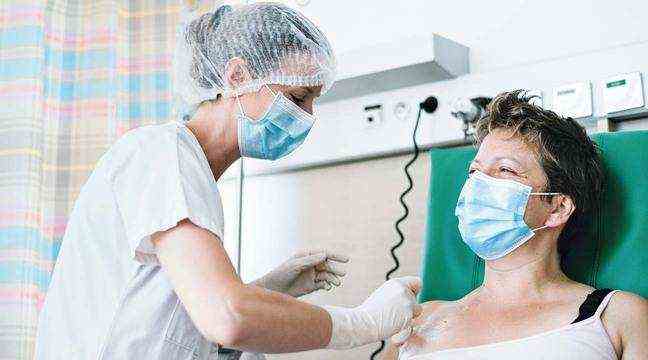A hollow instead of a feminine roundness. Losing a breast or the entire breast can be traumatic, and some women choose to go through a breast reconstruction, after cancer or as a preventive measure, due to a genetic mutation that makes them more prone to developing the disease.
More or less complex, long and painful operations, synonymous with an obstacle course or rebirth, as shown by the testimonies that 20 minutes collected on the occasion of Pink October.
“I almost took ownership of my ‘new breasts'”
“I was diagnosed” mutation BRCA2“in June 2020 at the age of 39, after several breast cancers and deaths in the family, says Christine, 40. I did not want a reconstruction with prostheses, because I felt that I would not be there comfortable with a foreign body. I turned to an immediate ablation and reconstruction with a thigh muscle, the technique best suited to my morphology. Eight hours of operation, one week of hospitalization, two surgeons for the act, one for ablation and the second for reconstruction, because everyone has their own specialty. “
But things got tough once on the pool table… “The operation lasted 10 hours after complications, continues Christine. I had a hemorrhage during the reconstruction of the breast, which had to be stopped and which earned me 12 hours of anesthesia, hypothermia and three transfusions. And the forty-something has not yet finished hearing about surgery. “Day by day, progress is there, healing is gaining ground, and after ten weeks of sick leave, I went back to work. The second operation for the breasts will be done in April 2022, for the recovery of scars and lipomodelling to improve the aesthetic appearance. For now, no regrets, I live with my scars, and I have almost made my “new breasts” my own. “
“It affects femininity, motherhood and sexuality”
This adaptation work is more or less sinuous. “Among the psychic specificities of having a breast removed, there is the fact that it affects femininity, motherhood, the nurturing function and sexuality,” underlines Caroline Marcotte, clinical psychologist at Institut Curie. I often see in patients either an experience of mutilation, or a vision of saving surgery. “
This is not denied by Corinne, who suffered from cancer at the age of 33. “Despite all these operations, the grafts that did not hold, the prostheses that had to be changed because they stuck to my skin, I was not going to die, it was the most important, says this now elderly reader. 58 years old. Having a 3 year old child, I fought for him, so that he had a mother like the others, who never complained. “
Psychological reconstruction is sometimes long overdue
Some patients digest the test alone, without psychological help. “It is not an obligation to be followed, warns Caroline Marcotte, but it seems important to me to be able to put the words, to elaborate this loss, to go through a work of mourning”, continues the psychologist. A necessary course even when these women return to the pool table to have a new breast. “Breast reconstruction does not rhyme with mental reconstruction, it is not a guarantee”, she insists. Hence the interest in asking the question: for what, and for whom do we want to go through these operations?
Each journey is unique and the feelings about this reconstruction, which can be immediate or take several months, differ enormously depending on the patient’s age, her family history, the context … “For preventive surgery, there was often a time for reflection, we make this choice our own, continues the psychologist. But in the case of a patient who has just been announced a cancer diagnosis and who is operated on the following week, she does not have this preparatory psychic time. To the question of time is added that of the relationship to the body. “In some patients, the breast was not invested. On the other hand with others, it was an asset of seduction, a pride. “
“A rebirth”
“Initially, I considered the reconstruction unnecessary because I was comfortable in my skin, in my head and in my sneakers, details Michèle, 79 years old, suffering from breast cancer in 2007. Then the negative test of a self-adhesive prosthesis made me change my mind. But I experienced this reconstruction, desired and successful. “
For Francesca, 60, who suffered from cancer in July 2010, the reconstruction – via a flap of skin from her stomach – was a reconnection to femininity. “I am reliving, this reconstruction is a victory over cancer,” confides this reader, operated on in February 2021 after a long medical career. I have regained a taste for life, I take pleasure in becoming coquettish again, I put on make-up again. It’s a rebirth, no pain, the healing of the flap is impeccable, that of the belly was much longer, but now everything is back to normal. “
“The risk is to consider him as an intruder”
Juliane, on the other hand, never showed off her breasts much. “When I was told of the genetic mutation, I was barely 20 years old and I think that unconsciously, I had made a cross on my chest, confides us the one who is 35 years old today. I had talked to my doctor about having a mastectomy before I was diagnosed with cancer… but unfortunately I didn’t have time. “
From the age of 33, the diagnosis of cancer upset the plans of the young woman. “Fortunately, my surgeon performed immediate reconstruction,” continues Juliane. I think I would have had a much harder time accepting the change if I saw my breasts missing after the operation. However, Caroline Marcotte warns that this first reflex can be misleading. “There can be the illusion of quickly erasing the traces of cancer, the impression that there will be no mourning to do. But it’s not the same breast, not the same shape, not the same sensitivity. The risk is to see him as an intruder. “

